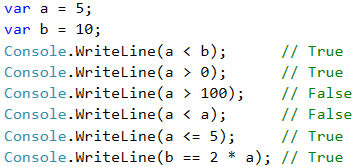Comparing Numbers
In programming, we can compare values using the following operators:
- Operator
<(less than) - Operator
>(greater than) - Operator
<=(less than or equals) - Operator
>=(greater than or equals) - Operator
==(equals) - Operator
!=(different from)
When compared, the result is a Boolean value true or false, depending on whether the result of the comparison is true or false.
Video: Comparing Numbers
Watch the video lesson about comparing numbers: https://youtu.be/KTdqDWg7Wf8.
Examples for Comparing Numbers

Note that when printing the true and false values in C # language, they are printed with a capital letter, respectively True and False.
Comparison Operators
In C#, we can use the following comparison operators:
| Operator | Notation | Applicable for |
|---|---|---|
| Equals | == | numbers, strings, dates |
| Not equal | != | |
| Greater than | > | numbers, dates, other comparable objects |
| Greater than or equals | >= | |
| Less than | < | |
| Less than or equals | <= |
The following example demonstrates how to use comparison operators in expressions:
